Though Isabelle Wen's (溫慶珠) latest spring/summer offering on the weekend was her favored combination of feminine frills and sequins, there was an edge that had observers saying it was one of her best collections yet.
The "Twirling Sofi" show at the designer's restaurant/lounge bar in Taipei may have been inspired by sufism and the dance of the whirling dervishes that is said to represent a spiritual journey to perfection, but it had the fashionable advantage of being sexy too.
Transparent tops, chiffon and lace set off by golden threads and colored sequins were combined for a look that was fresh and lively, with nods to the 60s and counter culture. A model twirling round in a gossamer light mini skirt was a magical and powerful image that summed up the show.
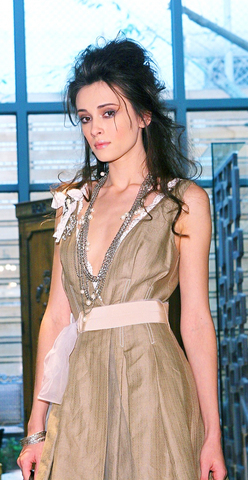
PHOTOS COURTESY OF ISABELLE WEN
And since this year is the 20th anniversary of the founding of her design company, the collection was an achievement that deserved all the applause it got. The Taipei fashionista has hit a high point in her career and the only problem is keeping up the momentum.
Wen has recently added a boutique to the number of stores that sell her clothes and has also successfully diversified, publishing a bimonthly style magazine, as well as opening Fifi restaurant, W lounge bar and the Japanese restaurant Bamboo. Her reputation is secure here and China beckons.
But behind success there is sometimes sadness. A brush with a life-threatening illness and overcoming a creative hiatus six years ago has made Wen more appreciative of life's blessings and drove her to reach greater heights. Even so, she said her public image was "a shell."
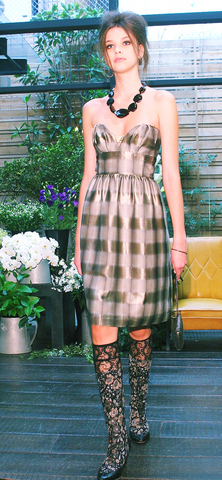
"Though I may be sick and tired it is my job to make people happy. I don't want them to see just the horrible side of life, it is my job to reveal beauty," Wen said in an interview on Tuesday at her studio and workshop in Shihlin. "Some people think I'm Superwoman, but you know that is just face."
Wen said her current collection was, to an extent, the result of overcoming problems. In fashion as in art, there is no gain without pain.
"I was listening to a midnight radio station called Ai Yue Diantai (
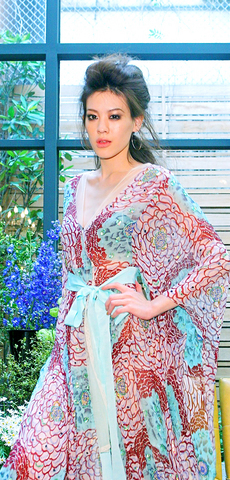
Like the dervish who attains a zen-like state, Wen said the music had helped her put "spiritual and material together" to come up with a concept for her show, "which is a way of letting fabric tell the story."
Wen's tale is an interesting one. Her father was a general in the Chinese Nationalist Party (KMT) and arrived with his wife on these shores in 1949. Wen was born in Taipei but spent time in Pingtung and Tainan, where her father later served as a police chief. It was her mother, however, who introduced the young Wen to the world of fashion.
"She was a real artist," Wen said. "She showed me around art galleries and introduced me to fashion. I remember going to the tailor with her around the age of five or six and I would tell them what I wanted."
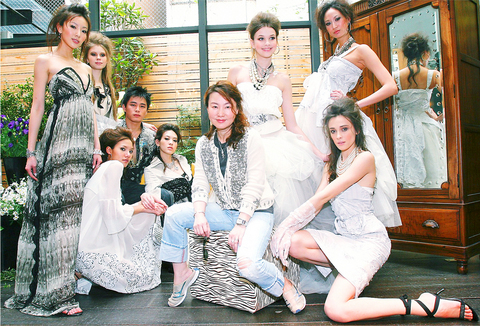
"First I dressed myself and others for my parents' parties; then I did the same for my friends' parties. Now it's my party. I have always done this. I have always followed my heart."
It was clearly a reasonably privileged upbringing. Her older sister Lily Wen (
"I didn't want to follow in anyone else's footsteps, I wanted to create my own life. ... As women we hide our true character until we die. If we do not then our men will not stay with us."
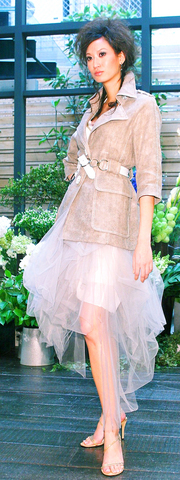
Though she attended Tanshui's Oxford College and did a course in tourism, her heart was in painting and she was the pupil of renowned painter O How-nien (
When her father died and her mother and older siblings emigrated to the US, "Fifi" as she was nicknamed, stayed in Taiwan and dressed the windows of a department store. She was then given some money in 1986 to start her own business in Dihua Street.
The fabric market in this area was the heart of Taiwan's rag trade at the time and Wen's progress mirrors that of Taiwan's fashion industry as a whole.
"When I started no-one bought local designs, everything was imported from Hong Kong, Europe and the United States. We knew nothing. This was the first stage. Now we have a lot of knowledge, but little understanding. This is the second stage."
The third step, according to Wen, is the relative maturity of Western fashion markets and successful branding.
"But I tell you, Beijing, Shanghai, these places will be as good as and better than New York and Milan. I guarantee you, in 10 years time, this is where the world will be looking."
Wen is also looking to China. But first, she says, "I want the world to know that Taiwan has great design."

From the last quarter of 2001, research shows that real housing prices nearly tripled (before a 2012 law to enforce housing price registration, researchers tracked a few large real estate firms to estimate housing price behavior). Incomes have not kept pace, though this has not yet led to defaults. Instead, an increasing chunk of household income goes to mortgage payments. This suggests that even if incomes grow, the mortgage squeeze will still make voters feel like their paychecks won’t stretch to cover expenses. The housing price rises in the last two decades are now driving higher rents. The rental market

Fifty-five years ago, a .25-caliber Beretta fired in the revolving door of New York’s Plaza Hotel set Taiwan on an unexpected path to democracy. As Chinese military incursions intensify today, a new documentary, When the Spring Rain Falls (春雨424), revisits that 1970 assassination attempt on then-vice premier Chiang Ching-kuo (蔣經國). Director Sylvia Feng (馮賢賢) raises the question Taiwan faces under existential threat: “How do we safeguard our fragile democracy and precious freedom?” ASSASSINATION After its retreat to Taiwan in 1949, the Chinese Nationalist Party (KMT) regime under Chiang Kai-shek (蔣介石) imposed a ruthless military rule, crushing democratic aspirations and kidnapping dissidents from
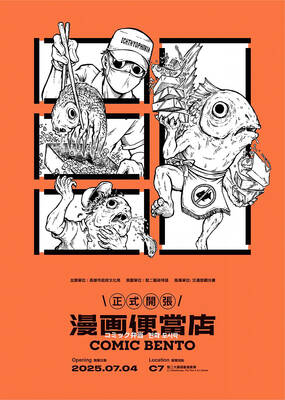
It looks like a restaurant — but it’s food for the mind. Kaohsiung’s Pier-2 Art Center is currently hosting Comic Bento (漫畫便當店), an immersive and quirky exhibition that spotlights Taiwanese comic and animation artists. The entire show is designed like a playful bento shop, where books, plushies and installations are laid out like food offerings — with a much deeper cultural bite. Visitors first enter what looks like a self-service restaurant. Comics, toys and merchandise are displayed buffet-style in trays typically used for lunch servings. Posters on the walls present each comic as a nutritional label for the stories and an ingredient
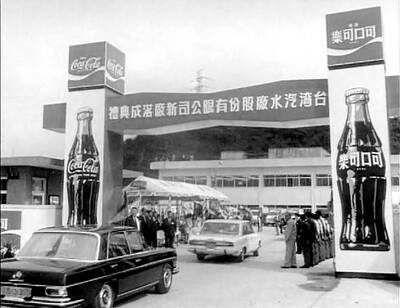
July 28 to Aug. 3 Former president Chiang Kai-shek (蔣介石) reportedly maintained a simple diet and preferred to drink warm water — but one indulgence he enjoyed was a banned drink: Coca-Cola. Although a Coca-Cola plant was built in Taiwan in 1957, It was only allowed to sell to the US military and other American agencies. However, Chiang’s aides recall procuring the soft drink at US military exchange stores, and there’s also records of the Presidential Office ordering in bulk from Hong Kong. By the 1960s, it wasn’t difficult for those with means or connections to obtain Coca-Cola from the